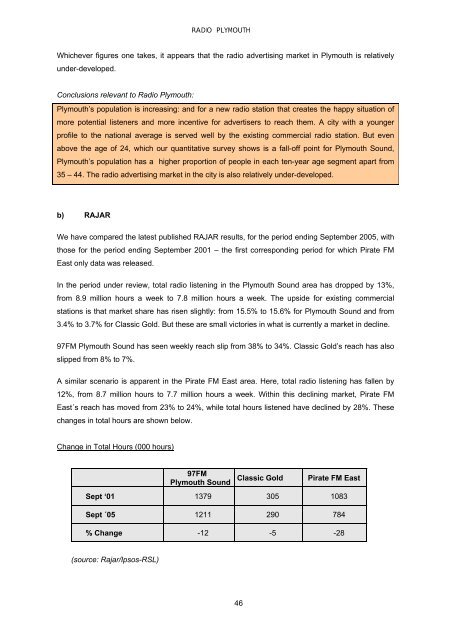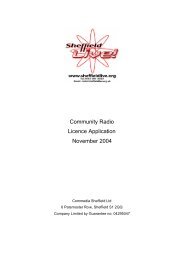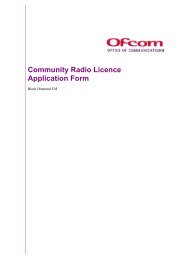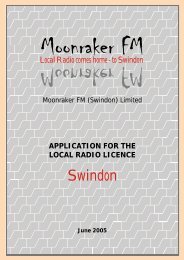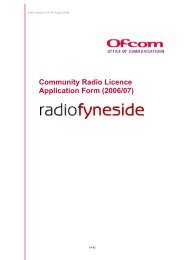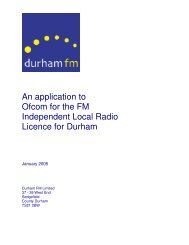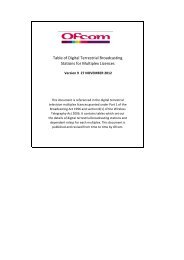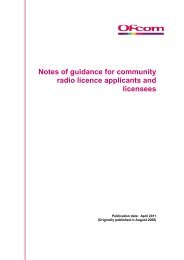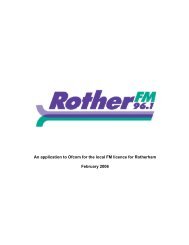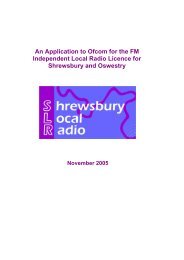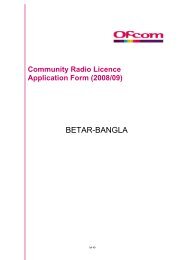Radio Plymouth - Ofcom Licensing
Radio Plymouth - Ofcom Licensing
Radio Plymouth - Ofcom Licensing
Create successful ePaper yourself
Turn your PDF publications into a flip-book with our unique Google optimized e-Paper software.
RADIO PLYMOUTH<br />
Whichever figures one takes, it appears that the radio advertising market in <strong>Plymouth</strong> is relatively<br />
under-developed.<br />
Conclusions relevant to <strong>Radio</strong> <strong>Plymouth</strong>:<br />
<strong>Plymouth</strong>’s population is increasing: and for a new radio station that creates the happy situation of<br />
more potential listeners and more incentive for advertisers to reach them. A city with a younger<br />
profile to the national average is served well by the existing commercial radio station. But even<br />
above the age of 24, which our quantitative survey shows is a fall-off point for <strong>Plymouth</strong> Sound,<br />
<strong>Plymouth</strong>’s population has a higher proportion of people in each ten-year age segment apart from<br />
35 – 44. The radio advertising market in the city is also relatively under-developed.<br />
b) RAJAR<br />
We have compared the latest published RAJAR results, for the period ending September 2005, with<br />
those for the period ending September 2001 – the first corresponding period for which Pirate FM<br />
East only data was released.<br />
In the period under review, total radio listening in the <strong>Plymouth</strong> Sound area has dropped by 13%,<br />
from 8.9 million hours a week to 7.8 million hours a week. The upside for existing commercial<br />
stations is that market share has risen slightly: from 15.5% to 15.6% for <strong>Plymouth</strong> Sound and from<br />
3.4% to 3.7% for Classic Gold. But these are small victories in what is currently a market in decline.<br />
97FM <strong>Plymouth</strong> Sound has seen weekly reach slip from 38% to 34%. Classic Gold’s reach has also<br />
slipped from 8% to 7%.<br />
A similar scenario is apparent in the Pirate FM East area. Here, total radio listening has fallen by<br />
12%, from 8.7 million hours to 7.7 million hours a week. Within this declining market, Pirate FM<br />
East´s reach has moved from 23% to 24%, while total hours listened have declined by 28%. These<br />
changes in total hours are shown below.<br />
Change in Total Hours (000 hours)<br />
97FM<br />
<strong>Plymouth</strong> Sound<br />
Classic Gold Pirate FM East<br />
Sept ‘01 1379 305 1083<br />
Sept ´05 1211 290 784<br />
% Change -12 -5 -28<br />
(source: Rajar/Ipsos-RSL)<br />
46


